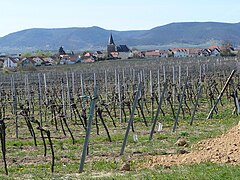Battle of Kirrweiler
The battle of Kirrweiler in the Palatinate took place during the First Coalition War between Prussian troops under Colonel Gebhard Leberecht von Blücher and parts of the French Rhine Army on May 28, 1794.
prehistory
Prussian troops tried to push the French Rhine Army, which had conquered and occupied large parts of the Palatinate , back into France. The French concentrated a division around Kaiserslautern and had built a strong line of defense between Neustadt and Speyer . However, when the French had to withdraw larger units of troops from the region in May 1794 and send them to the Dutch front for reinforcement, the coalition armies considered the time for an offensive in the Palatinate to be favorable. On May 23, the French lost a battle near Kaiserslautern; they then withdrew to more southern lines of defense. This also happened in the Vorderpfalz , where the French withdrew from Neustadt towards Landau on May 25th.
Course of battle
On May 27, the French Army on the Rhine under the leadership of General Claude Ignace François Michaud tried to regain Neustadt. Two columns advanced, one via Edenkoben and a second under General Louis Charles Antoine Desaix via Fischlingen and Kirrweiler towards Neustadt. Prussian hussars under Colonel Blücher therefore came to the aid of the Prussians stationed in Neustadt from the Neustadt valley . Blücher left six squadrons of hussars for reinforcement, with 9 squadrons of hussars from the regiments "Wolfrath" and "Goltz", Blücher surprisingly attacked the French who had already advanced to Diedesfeld , four kilometers from Neustadt, without waiting for the support of the slower infantry . Fierce fighting broke out between Maikammer and Kirrweiler, and the commander-in-chief of the French Army on the Rhine, General Michaud, was wounded. The French were pushed back as far as Edesheim and Fischlingen. The French casualties amounted to 15 officers and 400 soldiers; 400 prisoners were also taken and six cannons, five powder wagons and two flags were captured. The Prussian losses are said to have only been around 50 dead and wounded.
consequences
As a result of this battle, the Prussians were able to secure their position in the Front Palatinate between Neustadt and Speyer and set up outposts in the Palatinate Forest (at the Schänzel , Eschkopf and Johanniskreuz ) and establish contact with the Prussian troops in Kaiserslautern; but the French held the fortresses of Landau and Germersheim . In July, however, the French occupied the Palatinate for the second time, and then the areas that Blücher had won had to be cleared again. Due to his success at Kirrweiler, Blücher was promoted to major general and commander of the 8th Hussar Regiment ("Blücher Hussars") .
literature
- Hans Eggert Willibald von der Lühe: Militair-Conversations-Lexikon , Volume 4, p. 291 u. 292, Leipzig, 1834; (Digital scan)
Web links
Individual evidence
- ^ Franz Xaver Remling : The Rhine Palatinate in the Revolutionary Period from 1792 to 1798. A documented contribution to the patriotic history , Vol. II, Speyer 1866, p. 41f.
- ^ Franz Xaver Remling: The Rhine Palatinate in the Revolutionary Period from 1792 to 1798. A documentary contribution to the patriotic history , Vol. II, Speyer 1866, p. 48.
- ^ Heinrich Berghaus : Blücher as a member of the Pomeranian Knighthood 1777-1817 and with the Prussian Army on the Rhine 1794 , Anklam 1863, p. 77 u. P. 166.
- ^ Website on the Blücher Hussars with mention of the battle in Kirrweiler. ( Memento of the original from March 2, 2014 in the Internet Archive ) Info: The archive link was inserted automatically and has not yet been checked. Please check the original and archive link according to the instructions and then remove this notice.

